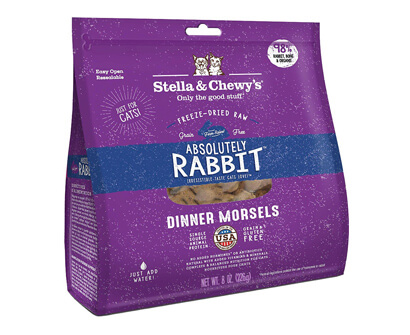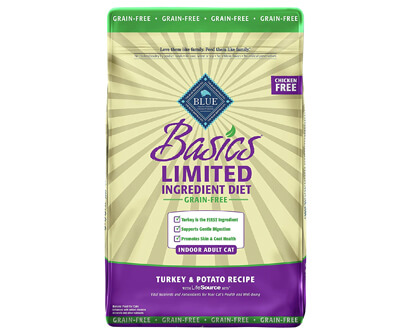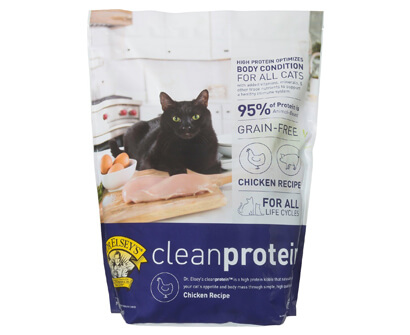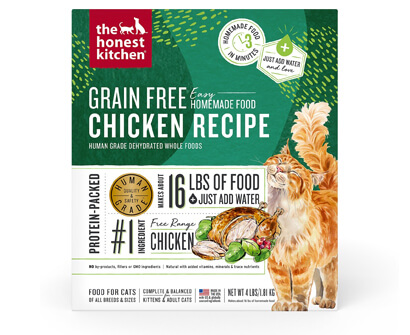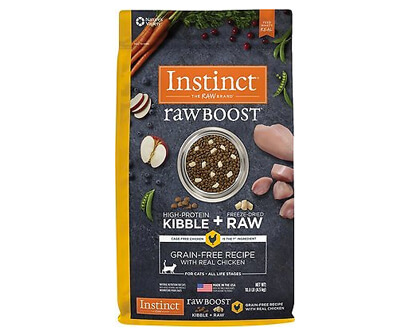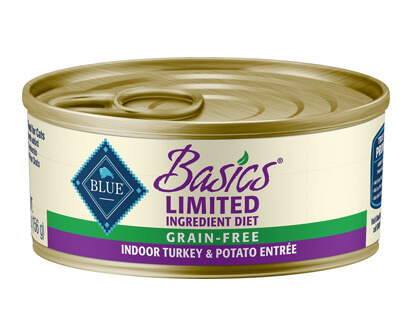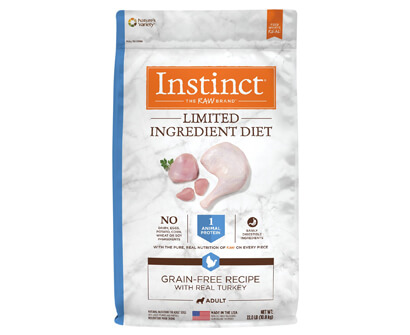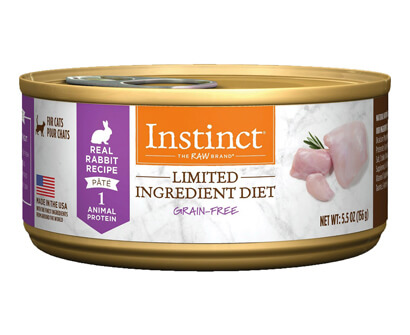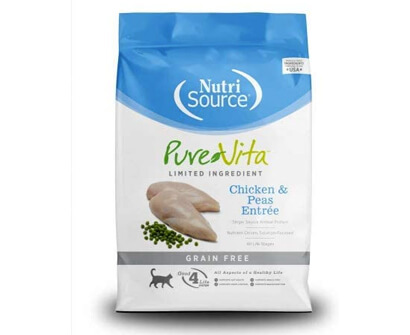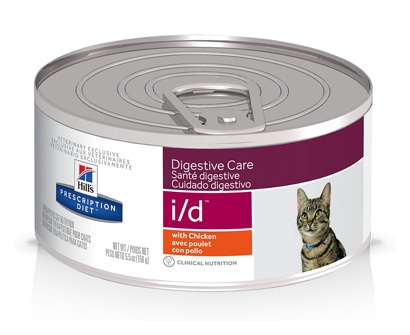Feline with Gut Issues? Our Best Cat Food for IBD is Easy to Swallow
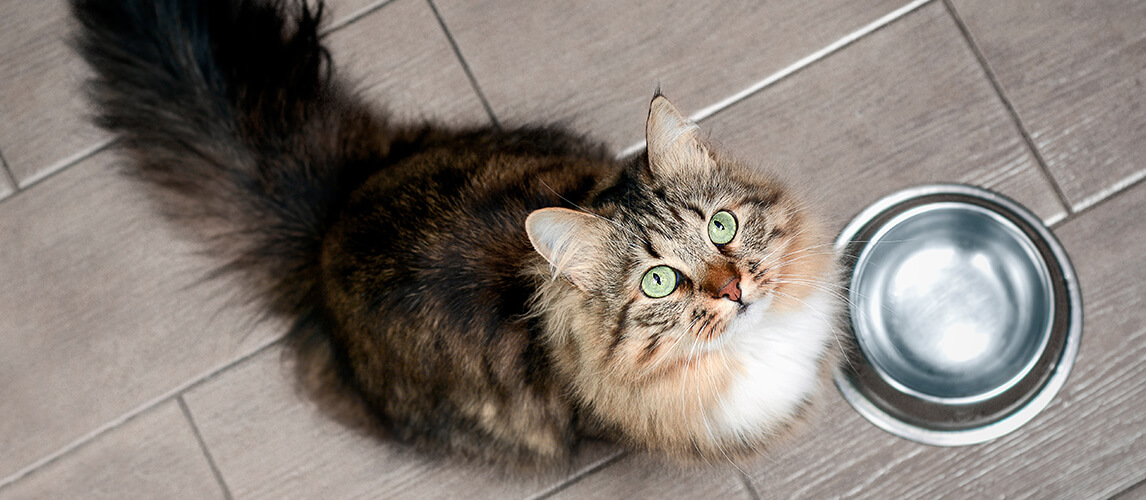
- Our List of The 10 Best Cat Foods for IBD
- 1. Stella & Chewy’s Absolutely Rabbit Dinner Morsels
- 2. Blue Buffalo Basics Limited Ingredient Diet
- 3. Dr. Elsey’s Cleanprotein Chicken Formula
- 4. The Honest Kitchen Dehydrated Grain Free Chicken Cat Food
- 5. Instinct Raw Boost Grain-Free Recipe
- 6. Blue Buffalo Basics Limited Ingredient Grain-Free Canned Cat Food
- 7. Instinct Limited Ingredient Diet Grain-Free Recipe
- 8. Instinct Limited Ingredient Diet Grain-Free Pate
- 9. PureVita GrainFree Chicken Entree Dry Cat Food
- 10. Hill’s Prescription Diet i/d Digestive Care with Chicken Wet Cat Food
Characterized by chronic inflammation and irritation of the digestive tract, feline inflammatory bowel disease (IBD) can affect all cats, although older cats tend to be more susceptible. And dietary management is one of the best ways to help control and reduce the unpleasant symptoms of this condition.
So, as well as following your veterinarian’s advice, choosing the best cat food for IBD is essential if your pet suffers from the condition’s associated digestive issues.
But how do you know which ingredients to look for, and which you need to avoid? In our review of the best cat food for IBD, we look at how what you put in your kit’s food bowl can help to put them back on the road to better digestive health.
Our List of The 10 Best Cat Foods for IBD
1. Stella & Chewy’s Absolutely Rabbit Dinner Morsels
Key Features
Kilocalories: 131 kcal/ounce
Minimum protein: 44%
Minimum fat: 30%
Maximum fiber: 5%
Maximum moisture: 5%
First three ingredients: rabbit with ground bone, rabbit liver, olive oil
Cats are carnivores and so thrive on an animal protein diet. With a cat that has IBD, you can help their symptoms by feeding them a natural diet that mimics their diet in the wild. Raw food diets can be beneficial and with Dinner Morsels from Stella & Chewy, going ‘raw’ is convenient and less messy.
With real rabbit as the novel animal protein, your kit is less likely to react and the quality is clear, with bones and organs also included. There is minimal processing and no added preservatives, grains, or fillers. Plus, this 100% organic cat food for IBD has 44% protein which is freeze dried so easy to feed to your pet.
Add in taurine and natural oils such as omega fatty acids for a healthy immune system, skin, and coat as well as probiotics to feed those good bacteria and while Dinner Morsels raw food is on the premium side of a price tag, it’s excellent for cats with IBD.
In short, this a highly digestible cat food that also packs a flavor punch, so your kit and their digestion are left calm, satisfied, and happy.
2. Blue Buffalo Basics Limited Ingredient Diet
Key Features
Kilocalories: 352 kcal/cup
Minimum protein: 20%
Minimum fat: 12%
Maximum fiber: 6%
Maximum moisture: 10%
First three ingredients: deboned turkey, potatoes, turkey meal (source of glucosamine)
Less can be more when it comes to what you feed your cat if they suffer from IBD but opting for a limited ingredient diet doesn’t mean they should lose out on satisfaction or taste.
Blue Buffalo’s Basics Limited Ingredient formula is grain-free so an excellent choice for cats with IBD as it removes those starchy irritants and non-essential carbs. Instead, you get a decent hit of real turkey which is the single source of protein and contains many essential vitamins and minerals. Then there’s potatoes and pumpkin, both of which are easily to digest and won’t irritate a sensitive stomach.
To ensure your kit has all the balanced nutrition they need to thrive, Blue Buffalo has also added in its own LifeSource Bits supplement that has been created by vets and animal nutritionists.
A straightforward, well-priced option if you are unsure what to feed a cat with IBD.
3. Dr. Elsey’s Cleanprotein Chicken Formula
Key Features
Kilocalories: 554 kcal/cup
Minimum protein: 59%
Minimum fat: 18%
Maximum fiber: 4%
Maximum moisture: 12%
First three ingredients: chicken, dried egg product, pork protein isolate
Quality, easy to digest protein is essential for a cat with IBD or food allergies, which you can find in Dr. Elsey’s Cleanprotein formula. As you would expect, this natural dry cat food recipe is grain-free and packed with essential vitamins and minerals for good health. However, it should be noted that the protein is not 100% sourced from animals.
They do state it is 90%+ animal based, although they do supplement the protein levels with egg so do be mindful of this if your cat doesn’t tolerate egg products very well. That aside, the nutritional value of this dry cat food is excellent and has been designed to optimize the condition of your average active cat.
What makes this product a contender in our best dry cat food for IBD review is the simple, clean and high-quality ingredients and the lower carb/gluten and grain free formula which helps to reduce inflammation and is gentle on your cat’s gut.
4. The Honest Kitchen Dehydrated Grain Free Chicken Cat Food
Key Features
Kilocalories: 576 kcal/cup
Minimum protein: 35%
Minimum fat: 28%
Maximum fiber: 2.5%
Maximum moisture: 5%
First three ingredients: chicken, sweet potatoes, potatoes
A high moisture alternative to wet cat food, The Honest Kitchen’s grain-free chicken recipe ensures your cat is sufficiently hydrated and healthy.
With free-range chicken and wholesome feline appropriate carbs such as sweet potato and pumpkin, all the ingredients in this recipe are human grade. And that means no artificial additives, or other digestive system ‘red flags’ including soy, corn, by-products or fillers.
We like how convenient and versatile this dehydrated cat food is. You simply add warm water to create a moist meal which can be fed on its own or used as a topper with kibble if your kit likes a crunch. And the hydration process makes this a value product as you get more than the original four-pound bag.
5. Instinct Raw Boost Grain-Free Recipe
Key Features
Kilocalories: 496 kcal/cup
Minimum protein: 41%
Minimum fat: 22%
Maximum fiber: 3.5%
Maximum moisture: 9%
First three ingredients: chicken, chicken meal, turkey meal
Another cat food for IBD that follows the raw diet principles, Instinct’s Raw Boost comes complete with raw toppers on tasty, grain-free kibble.
Using cage free chicken as the number one protein, the kibble is also free from potato, corn, soy, gluten, or by-product meal and there are no artificial additives. Each kibble biscuit is then topped with freeze-dried raw meat to create a delicious, gut-friendly treat.
Another benefit of Instinct Raw Boost if your cat is troubled by IBD is the added probiotics to support their digestive health as well as antioxidants for their immune system.
This is not only an excellent addition to our best cat food for IBD list but is a good choice for enticing picky eaters or cats who are off their food back to their food bowl.
6. Blue Buffalo Basics Limited Ingredient Grain-Free Canned Cat Food
Key Features
Kilocalories: 185 kcal/can
Minimum protein: 8%
Minimum fat: 6%
Maximum fiber: 1.5%
Maximum moisture: 78%
First three ingredients: turkey, turkey broth, turkey liver
If your cat has inflammatory bowel disease and prefers a canned diet, then Blue Buffalo Basics Limited Ingredient is up there as a contender for best wet cat food for IBD.
Following the same principles as the dry variety of the Limited Ingredient range, this richly moist entrée is both delicious and easy to digest. This also makes it a good option for senior cats or cats who may have issues with their teeth or mouth.
With real turkey as the single animal protein and stomach-friendly potato, it is also free of ingredients that could be seen as irritants for IBD sufferers, such as corn, soy or even beef.
The texture has been blended smooth for superior digestibility and the water content comes in at 78%. Used on its own or as a moisture-rich topper for a dry cat food, this is a simple, tasty, and nutritious wet cat food your feline will love.
7. Instinct Limited Ingredient Diet Grain-Free Recipe
Key Features
Kilocalories: 463 kcal/cup
Minimum protein: 35.5%
Minimum fat: 16.5%
Maximum fiber: 4%
Maximum moisture: 9%
First three ingredients: turkey meal, peas, turkey
Some of the more frequently used animal proteins, such as chicken and beef, can eventually cause digestive issues, especially if your kit is prone to IBD. But by adding a ‘novel’ protein, e.g., a meat your pet has not before, you can help to limit and manage their symptoms while ensuring they are getting the nutrients and taste they crave.
With Instinct Limited Ingredient diet, you get the benefits of turkey as the novel protein source as well as raw meat toppers for a concentrate protein hit. With just one vegetable – peas – recipe is also free of grain, dairy, eggs, unnecessary carbs, wheat, corn, and soy.
What you are left with is an easily digestible meal with high levels of nutrients, including those essential amino acids your kit needs for strong muscles and immune system support. And you can be reassured that the limited ingredients won’t irritate your already sensitive pet.
8. Instinct Limited Ingredient Diet Grain-Free Pate
Key Features
Kilocalories: 156 kcal/can
Minimum protein: 10%
Minimum fat: 3%
Maximum fiber: 1.5%
Maximum moisture: 76%
First three ingredients: rabbit, water, pea protein
Made with a single protein and one vegetable, the recipe may seem simple but there’s a lot to like about Instinct Limited Ingredient pate formula. With real rabbit at its heart, and added pea, your cat gets all the nutrients he needs without irritating his GI.
The texture of this pate is moist and enticing, so a good choice for kits who are off their food. With no corn, wheat, grains, dairy, eggs, or artificial additives including colors, flavors, or synthetic vitamins, this is pure and simple nutrition.
The high protein level ensures your cat gets his daily dose of amino acids plus those essential nutrients, including vitamins B, D and E to support your cat’s immune system and all-round health.
Gentle, tasty, and simple, this pate works well for your IBD suffering cat, and can be fed on its own or alongside his favorite kibble.
9. PureVita GrainFree Chicken Entree Dry Cat Food
Key Features
Kilocalories: 451 kcal/cup
Minimum protein: 32%
Minimum fat: 18%
Maximum fiber: 6.5%
Maximum moisture: 10%
First three ingredients: chicken, chicken meal, peas
Made using natural, holistic ingredients and based on a single protein source, PureVita Grain-free may not be the cheapest food to help with a cat’s IBD but it is reassuringly high quality.
Using whole chicken that is easy to digest and packed with essential vitamins and amino acids, this dry cat food is both tasty and kind on your cat’s digestive system. The primary vegetable is pea, so there are no excess carbs to irritate or bloat your pet, and it also includes chicken meal for a more concentrate hit of essential protein.
NutriSource also live up to its name, by ensuring there is the optimum balance of vitamins and minerals while avoiding grains, soy, corn and other IBD irritants. The result is a tasty meal for your pet that helps you manage their digestive symptoms for a happier, calmer life for your feline.
10. Hill’s Prescription Diet i/d Digestive Care with Chicken Wet Cat Food
Key Features
Kilocalories: 161 kcal/can
Minimum protein: 7.5%
Minimum fat: 4%
Maximum fiber: 1%
Maximum moisture: 78%
First three ingredients: water, pork liver
Specifically formulated for cats with digestive issues, Hill’s Prescription cat food has produced a targeted solution for IBD management.
I/D Digestive Care is a delicious chicken and vegetable stew that has been created by nutritionists and works along the principles of veterinary medicine. The chicken protein is highly digestible and enhanced by beneficial fats to support gut healing.
Meanwhile the prebiotic fiber content in this excellent cat food works to support effective mobility in the gastrointestinal tract and the healthy growth of good bacteria.
Add in antioxidants for immune support and omega fatty acids for your cat’s skin, you also get electrolytes and B vitamins to help replace lost nutrients due to digestive malabsorption.
This carefully formulated cat food is also recommended for felines recovering from routine gastro surgery or who have suffered a flare up of their IBD symptoms as it is gentle yet nourishing for their digestive system. For these reasons, we think this is one of the best wet cat foods for IBD sufferers you can buy.
Best Food for Cats with IBD: Buyer's Guide
What is IBD?
IBD – or inflammatory bowel disease – is a chronic condition of the cat’s gastrointestinal (GI)tract which can cause irritation and inflammation of their gut. IBD is also one of the most common causes of a condition caused colitis (acute or chronic inflammation of the colon) in felines.
IBD can in fact affect different parts of the GI tract, and so its location can identify the form of IBD your kit is suffering from. So, along with colitis, you can also have gastritis which affects the stomach, and enteritis where it affects the small intestines.
Wherever it is experienced, IBD causes inflammatory cells in the gut wall and ultimately affects the normal function of your cat’s digestion. This can result in poor digestion and also affect how cats can absorb nutrients, as well as irritation and pain.
Left untreated, the damage to their intestines can also lead to the development of a condition called leaky gut, where toxins and bacteria leak into the bloodstream. In some cases, IBD can be accompanied by inflammation of other internal organs such as the liver or pancreas.
While IBD can affect any kit, it is most commonly seen in middle-aged and older cats.
Symptoms of IBD in Cats
If you suspect your pet is suffering from IBD, then there are some common symptoms to look for. Typical signs of feline IBD include weight loss, vomiting, and diarrhea as well as blood in their stools. You may also notice a loss of appetite and signs of lethargy and excessive tiredness.
The severity of certain IBD symptoms can depend on the location of the inflammation in their digestive tract. Chronic vomiting, for example, could indicate that the stomach or small intestine is affected while excessive diarrhea, especially with bloody stools, could mean that their colon is the main site within their digestive symptom.
Symptoms of feline inflammatory bowel disease typically last for three weeks or more. If you suspect IBD or are concerned about the digestive health of your cat, a trip to the vet is essential. Your veterinarian will conduct tests to help ascertain a diagnosis and then advise on the best course of action.
For IBD symptoms, the typical treatment will involve a combination of medication and dietary management to control the condition.
What are the Causes of IBD in Cats?
The actual cause of feline inflammatory bowel disease is still unclear. However, it is thought that IBD is linked to the interaction between diet, immune system, and microbiome, or the healthy gut flora and bacteria found in a cat’s GI tract.
For reasons still to be defined, it is thought that the gut starts to react negatively to its normal microbiome which it now sees as a threat. It is also thought this reaction is due to abnormalities in the immune system.
Environmental factors, such as food, intestinal parasites, bacterial infections, or the ingestion of foreign substances, are also thought to play a part in the condition.
Cats with IBD – where inflamed cells penetrate the gut wall – eventually develop thicker and flatter intestinal lining, which impacts the cat’s digestive system to work as well as it should. And that can directly influence the cat’s ability to digest and properly absorb nutrients it needs for good health.

Things to Consider When Buying Cat Food for IBD
Your cat’s diet is at the heart of any management plan for IBD as the right food and nutrition can help to control the condition, manage any food sensitivities and keep your cat feeling comfortable and happy. And while a proper diet for cats with IBD may not eliminate the condition altogether it can keep those symptoms in check.
So, along with a veterinary-led medication plan if appropriate, here are the main things to consider when buying cat food specifically for IBD control:
Quality Protein
Your cat is a carnivore so the quality of the main ingredient – protein – in their diet is essential. Whether you opt for dry or canned cat foods, the protein needs to be easily digestible and from an animal source and can include bone and organs. The best cat foods for IBD should have 80-87% easily digestible, premium animal protein to nourish your cat's body.
Hypoallergenic Ingredients
As IBD can be exacerbated by allergens in your cat’s diet or your pet's food sensitivities, choosing a diet that eliminates the main allergens can be a good place to start. Acknowledging the role food allergies play in digestive issues can mean a diet with novel (that is, not common or known to your cat’s digestive system) ingredients, including the all-important protein. Rabbit, duck, turkey, and venison are popular choices.
Ditch the Fillers
A limited ingredient diet can also ensure you are reducing or eliminating unnecessary fillers which can be causing an issue.
Inflammatory Ingredients
As IBD indicates digestive tract inflammation, you want a low carbohydrate diet to avoid ingredients that are going to make this worse. And avoiding sources of plant protein – such as corn gluten meal, pea protein, and soy protein – is a good idea. Dairy and eggs are also known allergens for cats.
Avoid the Artificial
Any artificial ingredients such as additives, flavors, preservatives, and even sugar can all also irritate an already unhappy gut.
Gut-Soothing Ingredients
While cutting out the known irritants and allergens, it is also important to ensure your cat is stocking up on the gut-friendly ingredients to ensure they are still getting all the nutrients, vitamins, and minerals they need while working to reduce inflammation. Look for foods that supply probiotics and omega fatty acids, EPA, and DHA - ideally sourced from fish oil such as salmon oil - too.
Moisture
A diet with high water content is a good way to help eliminate dehydration, which is a common side-effect for cats with IBD. And this means feeding your cat wet canned food instead of kibble or using wet cat foods as a topper. You could also consider a raw diet or a rehydrated diet using dehydrated cat food instead of canned cat foods for a highly digestible meal.
Worst Foods for Cats with IBD
When managing the dietary health of a cat with IBD issues, it is also important to avoid certain foods. In many cases, it is not clear what a cat with inflammatory bowel disease is actually reacting to, so it is best to be cautious.
This means avoiding the foods that are typically known to aggravate a kit’s more sensitive digestion. And, as cats are predominately carnivores, these include grain-based food, such as corn, wheat, or rice which can be the worst foods to give a cat with IBD.
Also, avoid over-processed food and cat foods that contain artificial flavors and additives and which can irritate a cat's digestive system or inflame their food allergies.
Source:
- Role of microbiota in feline inflammatory bowel disease, NCBI
- Feline inflammatory bowel disease, Science Direct

